Healthcare Trust: Examining Issues and Rebuilding Trust in Healthcare
VerifiedAdded on 2023/03/31
|5
|958
|273
Essay
AI Summary
This essay examines the declining trust in the healthcare system, addressing ethical and moral perspectives. It explores the impact of legal and economic issues, such as breaches of confidentiality, crossing professional boundaries, and financial constraints, on the patient-nurse relationship. The essay analyzes how these factors contribute to an erosion of trust, emphasizing the importance of intercultural communication, patient-centered care, and the application of ethical principles like beneficence, non-maleficence, autonomy, and justice, based on the model of Beauchamp and Childress. The author suggests modifications to increase trust, focusing on improved communication skills and care delivery across different levels of the healthcare system, to foster a healthier environment for patients and providers. The essay concludes by highlighting the need for privacy, patient consent, and effective communication to rebuild and maintain trust in healthcare.
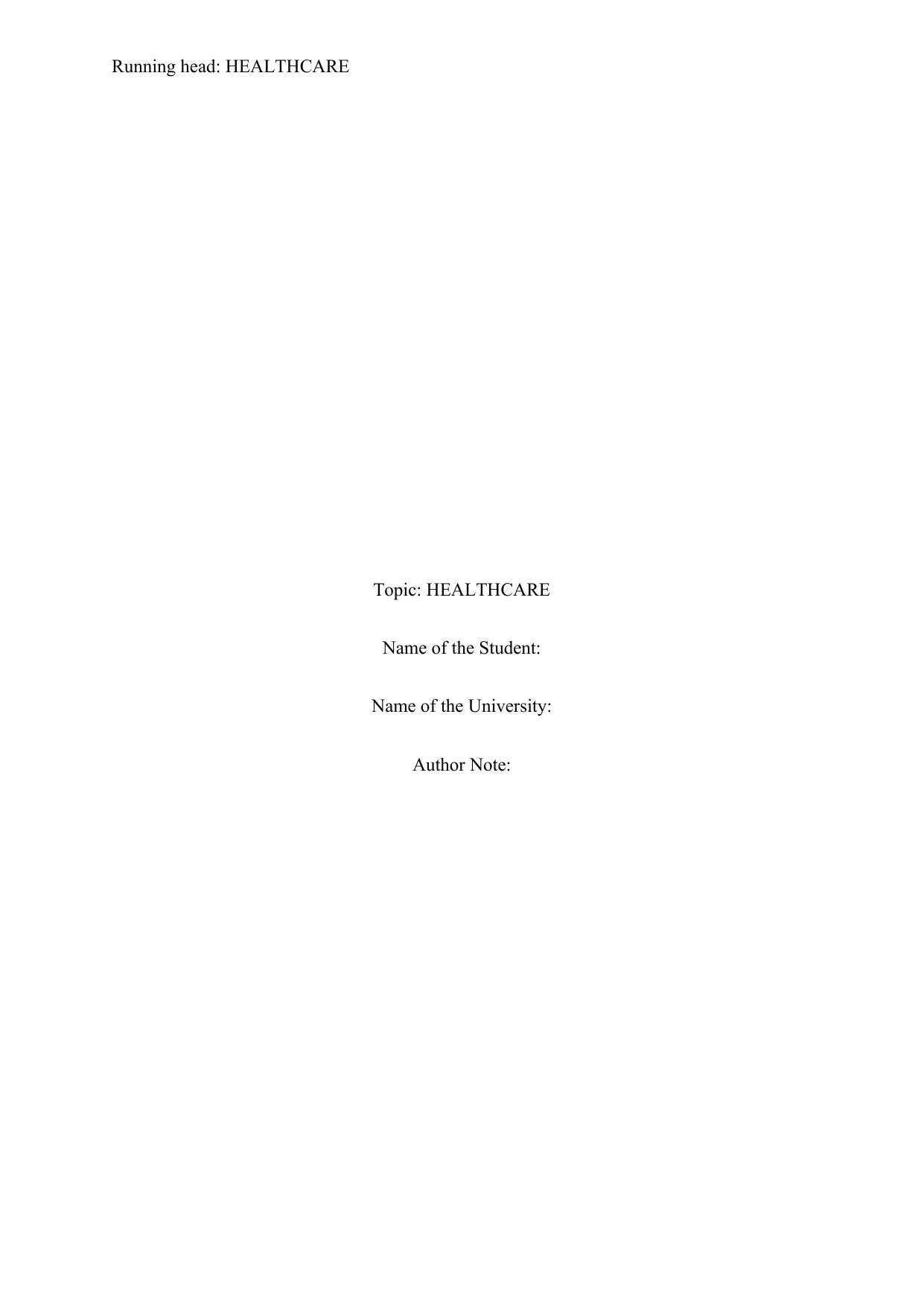
Running head: HEALTHCARE
Topic: HEALTHCARE
Name of the Student:
Name of the University:
Author Note:
Topic: HEALTHCARE
Name of the Student:
Name of the University:
Author Note:
Paraphrase This Document
Need a fresh take? Get an instant paraphrase of this document with our AI Paraphraser
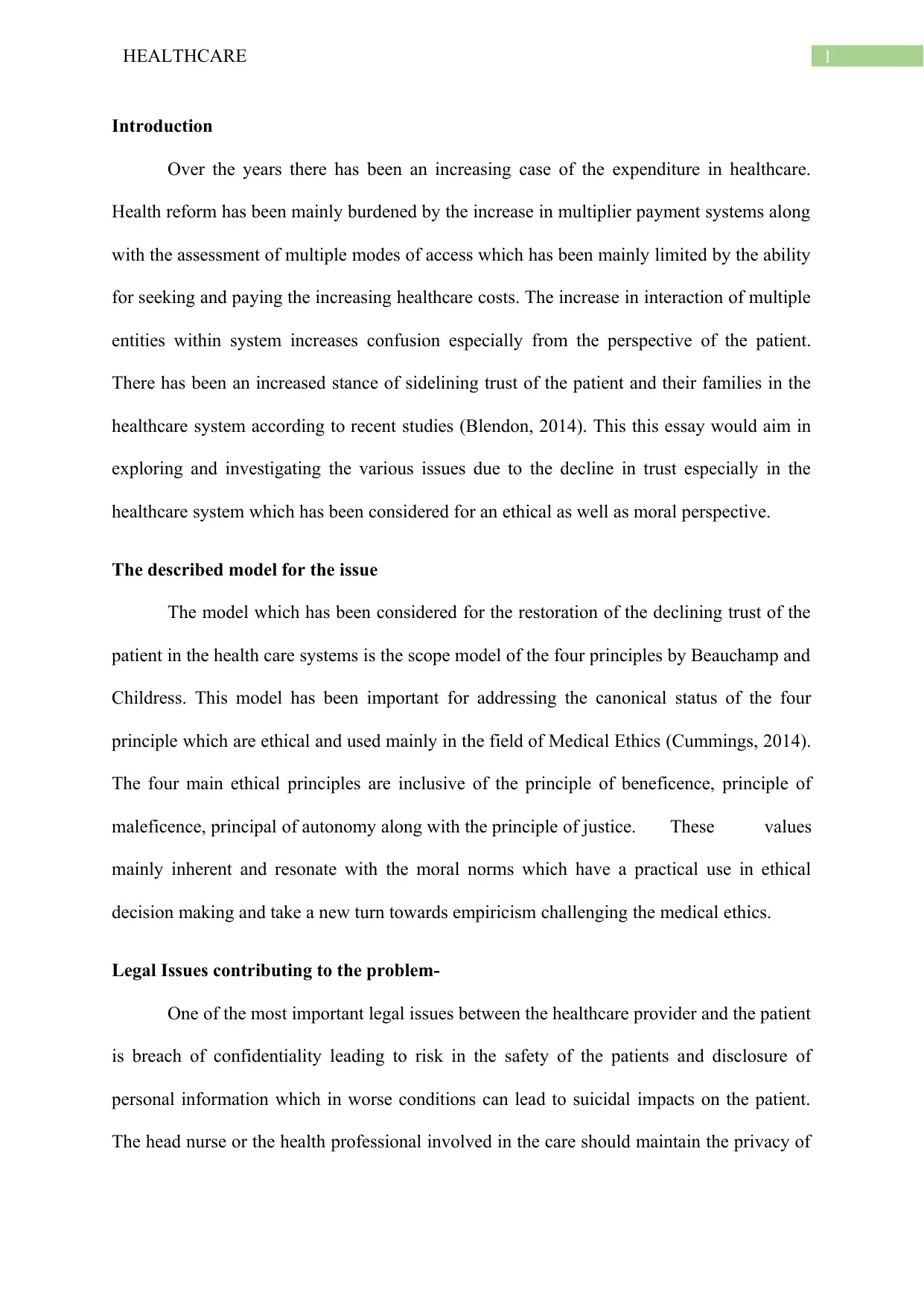
1HEALTHCARE
Introduction
Over the years there has been an increasing case of the expenditure in healthcare.
Health reform has been mainly burdened by the increase in multiplier payment systems along
with the assessment of multiple modes of access which has been mainly limited by the ability
for seeking and paying the increasing healthcare costs. The increase in interaction of multiple
entities within system increases confusion especially from the perspective of the patient.
There has been an increased stance of sidelining trust of the patient and their families in the
healthcare system according to recent studies (Blendon, 2014). This this essay would aim in
exploring and investigating the various issues due to the decline in trust especially in the
healthcare system which has been considered for an ethical as well as moral perspective.
The described model for the issue
The model which has been considered for the restoration of the declining trust of the
patient in the health care systems is the scope model of the four principles by Beauchamp and
Childress. This model has been important for addressing the canonical status of the four
principle which are ethical and used mainly in the field of Medical Ethics (Cummings, 2014).
The four main ethical principles are inclusive of the principle of beneficence, principle of
maleficence, principal of autonomy along with the principle of justice. These values
mainly inherent and resonate with the moral norms which have a practical use in ethical
decision making and take a new turn towards empiricism challenging the medical ethics.
Legal Issues contributing to the problem-
One of the most important legal issues between the healthcare provider and the patient
is breach of confidentiality leading to risk in the safety of the patients and disclosure of
personal information which in worse conditions can lead to suicidal impacts on the patient.
The head nurse or the health professional involved in the care should maintain the privacy of
Introduction
Over the years there has been an increasing case of the expenditure in healthcare.
Health reform has been mainly burdened by the increase in multiplier payment systems along
with the assessment of multiple modes of access which has been mainly limited by the ability
for seeking and paying the increasing healthcare costs. The increase in interaction of multiple
entities within system increases confusion especially from the perspective of the patient.
There has been an increased stance of sidelining trust of the patient and their families in the
healthcare system according to recent studies (Blendon, 2014). This this essay would aim in
exploring and investigating the various issues due to the decline in trust especially in the
healthcare system which has been considered for an ethical as well as moral perspective.
The described model for the issue
The model which has been considered for the restoration of the declining trust of the
patient in the health care systems is the scope model of the four principles by Beauchamp and
Childress. This model has been important for addressing the canonical status of the four
principle which are ethical and used mainly in the field of Medical Ethics (Cummings, 2014).
The four main ethical principles are inclusive of the principle of beneficence, principle of
maleficence, principal of autonomy along with the principle of justice. These values
mainly inherent and resonate with the moral norms which have a practical use in ethical
decision making and take a new turn towards empiricism challenging the medical ethics.
Legal Issues contributing to the problem-
One of the most important legal issues between the healthcare provider and the patient
is breach of confidentiality leading to risk in the safety of the patients and disclosure of
personal information which in worse conditions can lead to suicidal impacts on the patient.
The head nurse or the health professional involved in the care should maintain the privacy of
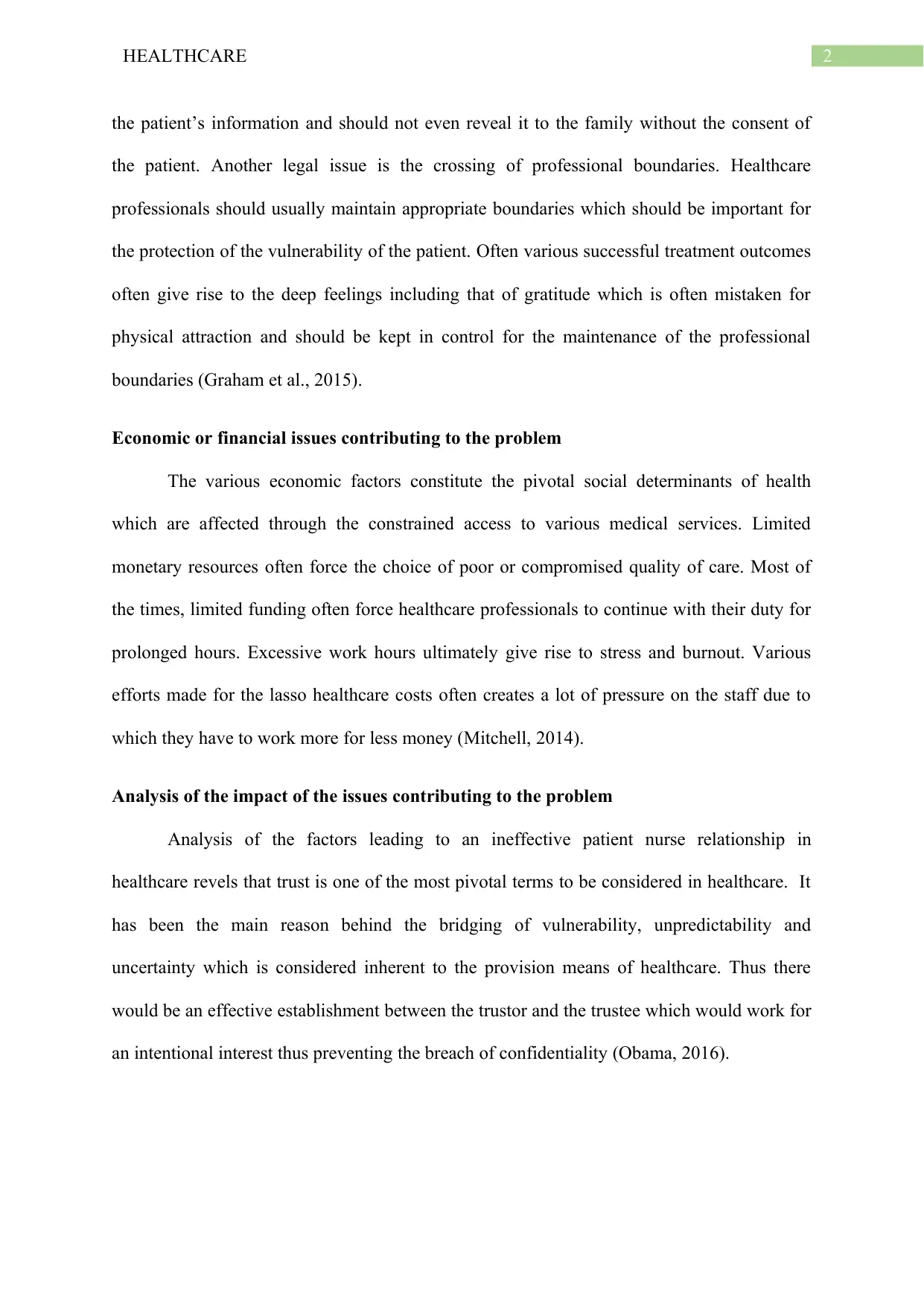
2HEALTHCARE
the patient’s information and should not even reveal it to the family without the consent of
the patient. Another legal issue is the crossing of professional boundaries. Healthcare
professionals should usually maintain appropriate boundaries which should be important for
the protection of the vulnerability of the patient. Often various successful treatment outcomes
often give rise to the deep feelings including that of gratitude which is often mistaken for
physical attraction and should be kept in control for the maintenance of the professional
boundaries (Graham et al., 2015).
Economic or financial issues contributing to the problem
The various economic factors constitute the pivotal social determinants of health
which are affected through the constrained access to various medical services. Limited
monetary resources often force the choice of poor or compromised quality of care. Most of
the times, limited funding often force healthcare professionals to continue with their duty for
prolonged hours. Excessive work hours ultimately give rise to stress and burnout. Various
efforts made for the lasso healthcare costs often creates a lot of pressure on the staff due to
which they have to work more for less money (Mitchell, 2014).
Analysis of the impact of the issues contributing to the problem
Analysis of the factors leading to an ineffective patient nurse relationship in
healthcare revels that trust is one of the most pivotal terms to be considered in healthcare. It
has been the main reason behind the bridging of vulnerability, unpredictability and
uncertainty which is considered inherent to the provision means of healthcare. Thus there
would be an effective establishment between the trustor and the trustee which would work for
an intentional interest thus preventing the breach of confidentiality (Obama, 2016).
the patient’s information and should not even reveal it to the family without the consent of
the patient. Another legal issue is the crossing of professional boundaries. Healthcare
professionals should usually maintain appropriate boundaries which should be important for
the protection of the vulnerability of the patient. Often various successful treatment outcomes
often give rise to the deep feelings including that of gratitude which is often mistaken for
physical attraction and should be kept in control for the maintenance of the professional
boundaries (Graham et al., 2015).
Economic or financial issues contributing to the problem
The various economic factors constitute the pivotal social determinants of health
which are affected through the constrained access to various medical services. Limited
monetary resources often force the choice of poor or compromised quality of care. Most of
the times, limited funding often force healthcare professionals to continue with their duty for
prolonged hours. Excessive work hours ultimately give rise to stress and burnout. Various
efforts made for the lasso healthcare costs often creates a lot of pressure on the staff due to
which they have to work more for less money (Mitchell, 2014).
Analysis of the impact of the issues contributing to the problem
Analysis of the factors leading to an ineffective patient nurse relationship in
healthcare revels that trust is one of the most pivotal terms to be considered in healthcare. It
has been the main reason behind the bridging of vulnerability, unpredictability and
uncertainty which is considered inherent to the provision means of healthcare. Thus there
would be an effective establishment between the trustor and the trustee which would work for
an intentional interest thus preventing the breach of confidentiality (Obama, 2016).
⊘ This is a preview!⊘
Do you want full access?
Subscribe today to unlock all pages.

Trusted by 1+ million students worldwide
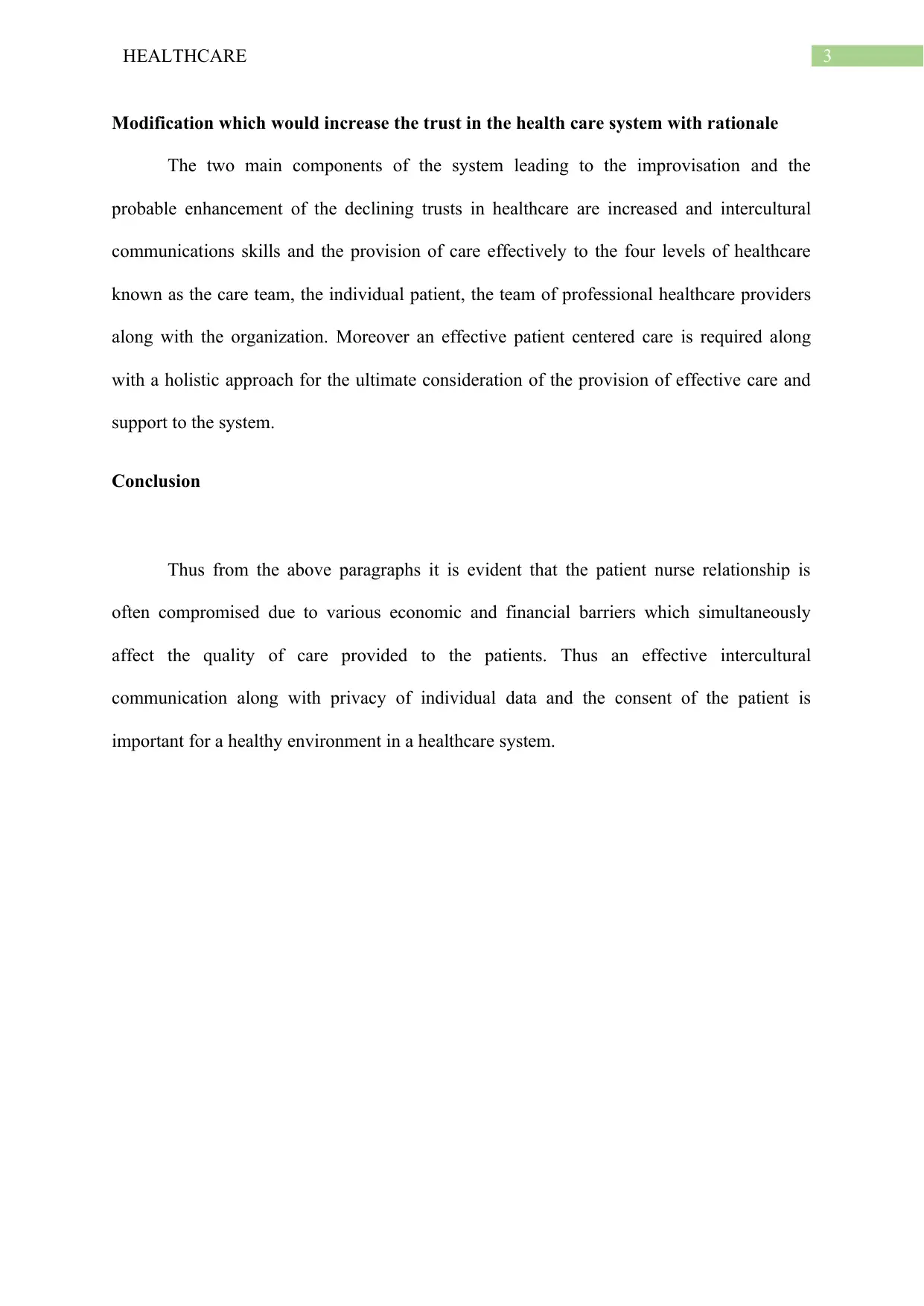
3HEALTHCARE
Modification which would increase the trust in the health care system with rationale
The two main components of the system leading to the improvisation and the
probable enhancement of the declining trusts in healthcare are increased and intercultural
communications skills and the provision of care effectively to the four levels of healthcare
known as the care team, the individual patient, the team of professional healthcare providers
along with the organization. Moreover an effective patient centered care is required along
with a holistic approach for the ultimate consideration of the provision of effective care and
support to the system.
Conclusion
Thus from the above paragraphs it is evident that the patient nurse relationship is
often compromised due to various economic and financial barriers which simultaneously
affect the quality of care provided to the patients. Thus an effective intercultural
communication along with privacy of individual data and the consent of the patient is
important for a healthy environment in a healthcare system.
Modification which would increase the trust in the health care system with rationale
The two main components of the system leading to the improvisation and the
probable enhancement of the declining trusts in healthcare are increased and intercultural
communications skills and the provision of care effectively to the four levels of healthcare
known as the care team, the individual patient, the team of professional healthcare providers
along with the organization. Moreover an effective patient centered care is required along
with a holistic approach for the ultimate consideration of the provision of effective care and
support to the system.
Conclusion
Thus from the above paragraphs it is evident that the patient nurse relationship is
often compromised due to various economic and financial barriers which simultaneously
affect the quality of care provided to the patients. Thus an effective intercultural
communication along with privacy of individual data and the consent of the patient is
important for a healthy environment in a healthcare system.
Paraphrase This Document
Need a fresh take? Get an instant paraphrase of this document with our AI Paraphraser
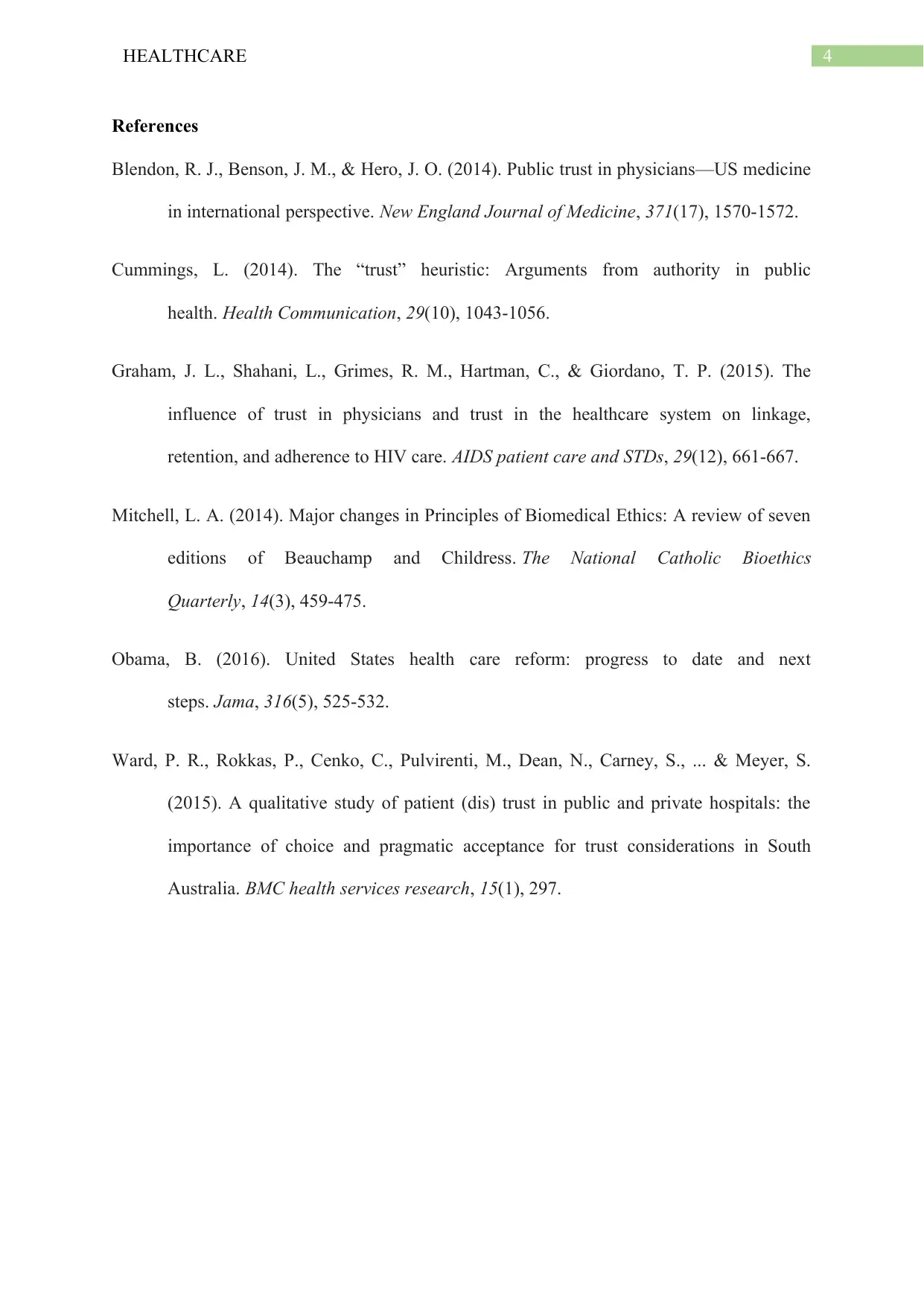
4HEALTHCARE
References
Blendon, R. J., Benson, J. M., & Hero, J. O. (2014). Public trust in physicians—US medicine
in international perspective. New England Journal of Medicine, 371(17), 1570-1572.
Cummings, L. (2014). The “trust” heuristic: Arguments from authority in public
health. Health Communication, 29(10), 1043-1056.
Graham, J. L., Shahani, L., Grimes, R. M., Hartman, C., & Giordano, T. P. (2015). The
influence of trust in physicians and trust in the healthcare system on linkage,
retention, and adherence to HIV care. AIDS patient care and STDs, 29(12), 661-667.
Mitchell, L. A. (2014). Major changes in Principles of Biomedical Ethics: A review of seven
editions of Beauchamp and Childress. The National Catholic Bioethics
Quarterly, 14(3), 459-475.
Obama, B. (2016). United States health care reform: progress to date and next
steps. Jama, 316(5), 525-532.
Ward, P. R., Rokkas, P., Cenko, C., Pulvirenti, M., Dean, N., Carney, S., ... & Meyer, S.
(2015). A qualitative study of patient (dis) trust in public and private hospitals: the
importance of choice and pragmatic acceptance for trust considerations in South
Australia. BMC health services research, 15(1), 297.
References
Blendon, R. J., Benson, J. M., & Hero, J. O. (2014). Public trust in physicians—US medicine
in international perspective. New England Journal of Medicine, 371(17), 1570-1572.
Cummings, L. (2014). The “trust” heuristic: Arguments from authority in public
health. Health Communication, 29(10), 1043-1056.
Graham, J. L., Shahani, L., Grimes, R. M., Hartman, C., & Giordano, T. P. (2015). The
influence of trust in physicians and trust in the healthcare system on linkage,
retention, and adherence to HIV care. AIDS patient care and STDs, 29(12), 661-667.
Mitchell, L. A. (2014). Major changes in Principles of Biomedical Ethics: A review of seven
editions of Beauchamp and Childress. The National Catholic Bioethics
Quarterly, 14(3), 459-475.
Obama, B. (2016). United States health care reform: progress to date and next
steps. Jama, 316(5), 525-532.
Ward, P. R., Rokkas, P., Cenko, C., Pulvirenti, M., Dean, N., Carney, S., ... & Meyer, S.
(2015). A qualitative study of patient (dis) trust in public and private hospitals: the
importance of choice and pragmatic acceptance for trust considerations in South
Australia. BMC health services research, 15(1), 297.
1 out of 5
Related Documents
Your All-in-One AI-Powered Toolkit for Academic Success.
+13062052269
info@desklib.com
Available 24*7 on WhatsApp / Email
![[object Object]](/_next/static/media/star-bottom.7253800d.svg)
Unlock your academic potential
Copyright © 2020–2026 A2Z Services. All Rights Reserved. Developed and managed by ZUCOL.





